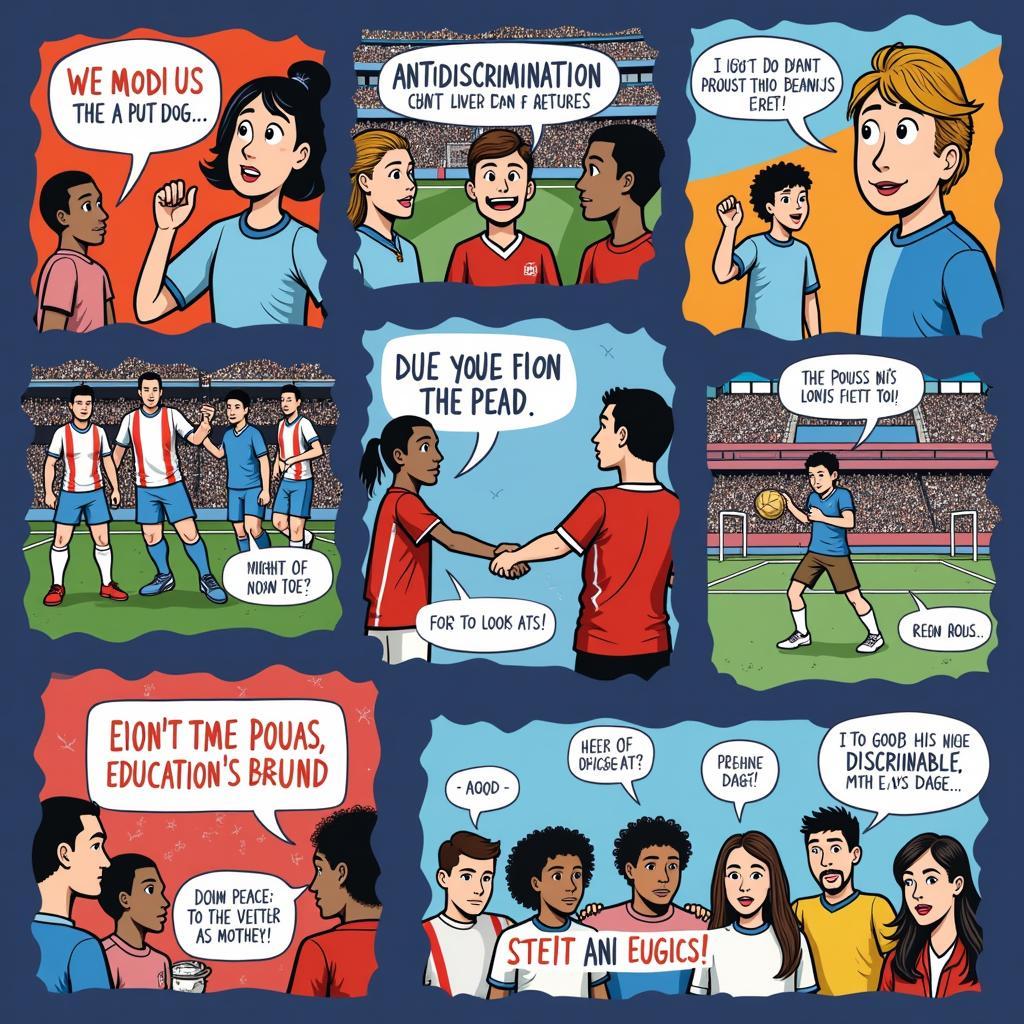The term “toxic fan” gets thrown around a lot in football discussions, particularly online. But what does it truly mean? Essentially, a toxic fan is someone who takes their fandom too far, engaging in harmful or negative behavior that detracts from the enjoyment of the sport for others. While passionate support is encouraged, toxic fans cross the line, often displaying aggression, disrespect, and a win-at-all-costs mentality that overshadows the true spirit of the game.
Identifying the Traits: How to Spot a Toxic Fan
While some signs are blatant, others can be subtle. Here’s what to look out for:
- Extreme negativity: Constantly criticizing their own team or players, even after a minor loss or a single mistake. This negativity often extends to personal insults and threats directed at players, coaches, and even fellow fans.
- Intolerance and abuse: Exhibiting zero tolerance for opposing viewpoints, resorting to insults, harassment, and even discrimination against fans of rival teams or those with differing opinions.
- Unrealistic expectations: Setting impossibly high standards for their team, leading to disproportionate outrage and disappointment at any setback. This can manifest as calls for player or manager sackings after a single loss.
- Obsessive behavior: Allowing football to consume their lives to an unhealthy extent, often neglecting personal responsibilities, relationships, and even their own well-being in pursuit of their team’s success.
- Glorifying violence: Condoning or even encouraging violence among fans, both verbally and physically. This can include online threats, vandalism, and actual physical altercations with opposing fans.
 Example of Toxic Fan Behavior
Example of Toxic Fan Behavior
The Real-World Impact: Why Toxicity Matters
Toxic fandom isn’t just an online phenomenon; it spills over into real life, creating a hostile and divisive atmosphere within the sport:
- Damaging the fan experience: Genuine fans feel uncomfortable or unsafe expressing their love for the game due to fear of confrontation or abuse from toxic individuals.
- Hurting the sport’s image: Negative fan behavior reflects poorly on the sport as a whole, potentially driving away sponsors, investors, and young fans.
- Impacting players’ mental health: Constant criticism, abuse, and threats take a toll on players’ mental well-being, impacting their performance and overall enjoyment of the game.
- Fueling societal issues: Toxic fan behavior often intersects with broader societal issues such as racism, sexism, and homophobia, perpetuating harmful stereotypes and discrimination.
Combating Toxicity: A Collective Responsibility
Addressing this problem requires a multi-pronged approach involving individuals, clubs, and governing bodies:
- Promoting positive fan culture: Encouraging respectful dialogue, celebrating sportsmanship, and emphasizing the unifying power of football are crucial steps.
- Holding individuals accountable: Clubs and authorities need to implement stricter measures to identify, penalize, and even ban fans engaging in toxic behavior.
- Educating younger generations: Instilling values of respect, tolerance, and fair play in young fans is vital to creating a more positive future for the sport.
 Efforts to Combat Fan Toxicity
Efforts to Combat Fan Toxicity
Remember: True Fandom is About Passion, Not Poison
While the actions of toxic fans can be disheartening, it’s important to remember that they represent a small minority within the larger football community. The vast majority of fans are passionate, respectful, and genuinely invested in the beautiful game.
By understanding the traits of toxic fandom and actively promoting a more positive and inclusive environment, we can ensure that football remains a source of joy, excitement, and unity for generations to come.
Let’s celebrate the sport we love in a way that honors its spirit and brings out the best in all of us. After all, true fandom is about passion, not poison.
FAQs:
- Is all criticism of a team considered toxic? No, constructive criticism is part of any sport. Toxicity arises when criticism becomes abusive, personal, and relentless.
- What can I do if I encounter toxic behavior online? Report the behavior to the platform, block the user, and avoid engaging in arguments.
- How can clubs help combat toxic fandom? Implement stricter security measures, educate fans on acceptable behavior, and support initiatives promoting positive fan culture.
For more information on fan culture and related topics, check out these articles:
Remember, the fight against toxic fandom requires a collective effort. Let’s create a more inclusive and enjoyable football experience for everyone.
Need support or want to report an incident? Contact us at:
Phone: 0903426737
Email: fansbongda@gmail.com
Address: Tổ 9, Khu 6, Phường Giếng Đáy, Thành Phố Hạ Long, Giếng Đáy, Hạ Long, Quảng Ninh, Việt Nam.
Our customer support team is available 24/7 to assist you.


